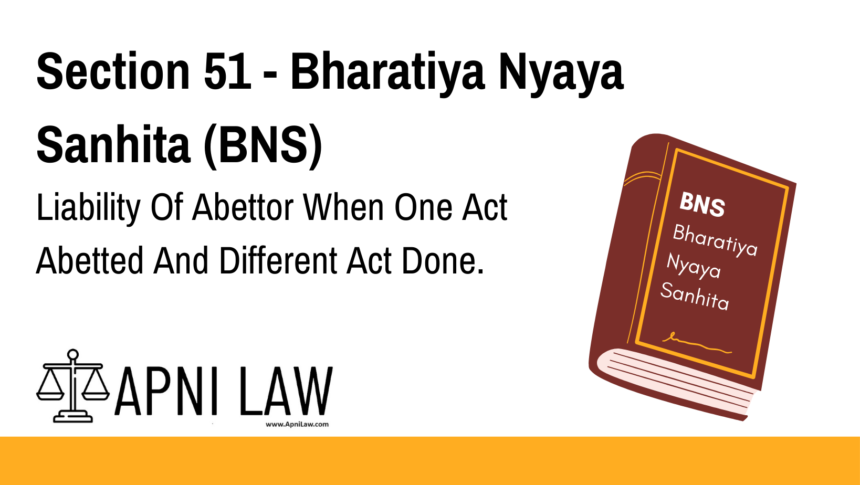Code: Section 51 BNS
When an act is abetted and a different act is done, the abettor is liable for the act
done, in the same manner and to the same extent as if he had directly abetted it:
Provided that the act done was a probable consequence of the abetment, and was
committed under the influence of the instigation, or with the aid or in pursuance of the
conspiracy which constituted the abetment.
Illustrations.
(a) A instigates a child to put poison into the food of Z, and gives him poison for that
purpose. The child, in consequence of the instigation, by mistake puts the poison into the
food of Y, which is by the side of that of Z. Here, if the child was acting under the influence
of A’s instigation, and the act done was under the circumstances a probable consequence of
the abetment, A is liable in the same manner and to the same extent as if he had instigated the
child to put the poison into the food of Y.
(b) A instigates B to burn Z’s house, B sets fire to the house and at the same time
commits theft of property there. A, though guilty of abetting the burning of the house, is not
guilty of abetting the theft; for the theft was a distinct act, and not a probable consequence
of the burning.
(c) A instigates B and C to break into an inhabited house at midnight for the purpose of
robbery, and provides them with arms for that purpose. B and C break into the house, and
being resisted by Z, one of the inmates, murder Z. Here, if that murder was the probable
consequence of the abetment, A is liable to the punishment provided for murder.
Explanation of Section 51 BNS
1. Understanding the Liability of an Abettor
Section 51 of the Bharatiya Nyaya Sanhita (BNS), 2023, establishes that if an abettor instigates, aids, or conspires in the commission of a particular crime, but another related crime occurs as a probable consequence, the abettor is still held responsible.
However, the abettor is not liable for crimes that were unexpected or independent of the original abetment.
2. Essential Conditions for Liability Under Section 51
To hold an abettor liable for an act different from the one abetted, the following conditions must be met:
- The act committed was a probable consequence of the abetment.
- The act was committed under the influence of the abetment, whether by instigation, aiding, or conspiracy.
- The crime committed was closely linked to the original intent of the abetment.
3. Difference Between Probable and Distinct Acts
- If an abetted act naturally leads to another act, the abettor is liable for both.
- If the committed act is separate and not a likely result of abetment, the abettor is not responsible.
Example:
- If A hires B to commit assault, but B murders the victim instead, A may be liable if murder was a probable outcome.
- If A hires B to burn a house, and B also steals jewelry, A is not liable for theft unless theft was part of the plan.
Common Questions and Answers on Section 51 BNS
1. What is the key principle behind Section 51 BNS?
It ensures that an abettor cannot escape liability simply because the act committed was slightly different from the one planned—provided it was a probable outcome of the abetment.
2. Can an abettor be punished for an act he never intended?
Yes, if the committed act was a probable consequence of the abetment, the abettor will be punished as if he directly abetted that act.
3. How does the court determine if an act was a “probable consequence”?
The court considers:
- The nature of the abetment (instigation, aiding, or conspiracy).
- The circumstances surrounding the act.
- Whether the committed act was reasonably foreseeable.
4. Can an abettor escape liability if the principal offender exceeded instructions?
Yes, if the offender committed an act entirely different from the abetment and it was not a probable outcome.
5. How does this section compare to general criminal liability?
- Unlike direct liability, where a person commits an offense themselves, Section 51 BNS imposes liability on those who encourage, assist, or plan crimes that lead to related but different acts.
Conclusion
Section 51 of the Bharatiya Nyaya Sanhita (BNS), 2023, plays a crucial role in holding abettors accountable for offenses that arise as a natural consequence of their instigation, aiding, or conspiracy. It ensures that legal responsibility is not limited to just the act initially planned but extends to related acts that could have been reasonably foreseen.
For more legal insights, visit ApniLaw today! 🚀








